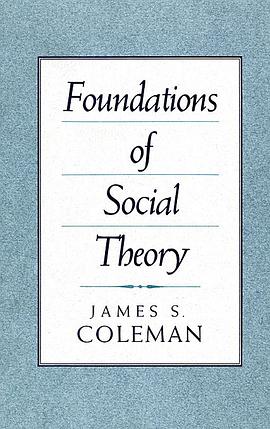Foundations of Social Theory
豆瓣
James S. Coleman
简介
Combining principles of individual rational choice with a sociological conception of collective action, James Coleman recasts social theory in a bold new way. The result is a landmark in sociological theory, capable of describing both stability and change in social systems.
This book provides for the first time a sound theoretical foundation for linking the behavior of individuals to organizational behavior and then to society as a whole. The power of the theory is especially apparent when Coleman analyzes corporate actors, such as large corporations and trade unions. He examines the creation of these institutions, collective decision making, and the processes through which authority is revoked in revolts and revolutions.
Coleman discusses the problems of holding institutions responsible for their actions as well as their incompatibility with the family. He also provides a simple mathematical analysis corresponding to and carrying further the verbal formulations of the theory. Finally, he generates research techniques that will permit quantitative testing of the theory.
From a simple, unified conceptual structure Coleman derives, through elegant chains of reasoning, an encompassing theory of society. It promises to be the most important contribution to social theory since the publication of Talcott Parsons’ Structure of Social Action in 1936.
contents
What Is Meant by Efficiency?
The Rationality of Norms
31. Indivisible Events, Corporate Actors, and Collective Decisions
When Will Control of Events Be Collectivized?
The Constitutional Stage
The Postconstitutional Stage
Social Choice by Various Decision Rules
Conflict
32. Dynamics of the Linear System of Action
Exchange with Two Actors and Two Resources
Change in Resources Held by One Actor
Movement of a Resource among Actors
Logical Constraints on Transition Rates in Pairwise Exchange Systems
A Description of the Path of Values: Walrasian Adjustment
Dynamics of Systems with Social-Structural Barriers
How Do Power of Actors and Values of Events Change?
33. Unstable and Transient Systems of Action
Single-Contingency and Double-Contingency Collective Behavior
Transfer of Control in Single-Contingency Panics
Double-Contingency Panics
Evolution of Strategies
34. The Internal Structure of Actors
Event Outcomes as Actions of a Corporate Actor
Corporate Outcomes and Public-Good Problems
The Value of Resources and the Interests of a Corporate Actor
Subjective and Objective Interests of a Corporate Actor
The Internal Structure of Persons as Actors
References
Name Index
Subject Index


